Yesterday President Barack Obama signed an executive order to prevent federal vendors from prohibiting their employees from inquiring about, disclosing, or discussing their compensation with fellow workers. The April 8 order, titled “Non-Retaliation for Disclosure of Compensation Information,” is intended […]

Yesterday President Barack Obama signed an executive order to prevent federal vendors from prohibiting their employees from inquiring about, disclosing, or discussing their compensation with fellow workers.
The April 8 order, titled “Non-Retaliation for Disclosure of Compensation Information,” is intended to discover, remediate, and help eliminate compensation discrimination.
The president’s order justified this prohibition by stating, “Federal contractors that employ [compensation discrimination] are subject to enforcement action, increasing the risk of disruption, delay, and increased expense in Federal contracting. Compensation discrimination also can lead to labor disputes that are burdensome and costly.”
The order takes effect immediately and will apply to new contracts entered into once the Department of Labor creates rules promulgating the order.
April 9, 2014 •
Minnesota Campaign Finance Law Challenged in Wake of McCutcheon
A lawsuit has been filed by the Institute for Justice, joined by several donors and candidates, challenging a Minnesota campaign finance law. Under section 10A.27(11) of the Minnesota Statutes, the “special sources limit” prohibits a campaign from raising more than […]

A lawsuit has been filed by the Institute for Justice, joined by several donors and candidates, challenging a Minnesota campaign finance law. Under section 10A.27(11) of the Minnesota Statutes, the “special sources limit” prohibits a campaign from raising more than 20 percent of its total contributions from lobbyists, political action committees, and large donors.
The Institute for Justice is arguing this law is unconstitutional under the First Amendment, stating “The first people to speak have full rights, but subsequent speakers have half rights.”
The case, Seaton v. Weiner, was filed in federal court on April 8.
April 9, 2014 •
Wednesday Government Relations News
Lobbying “Lobbying World” in The Hill. Hawaii’s SB 2629 Lobbyist Disclosure Bill passes House: “Hawaii lawmakers plow through mountain of bills” by Cathy Bussewitz and Sam Eifling (Associated Press) in The Republic. Wisconsin: “Dem legislator: Lobbyists don’t bother talking to us […]

Lobbying
“Lobbying World” in The Hill.
Hawaii’s SB 2629 Lobbyist Disclosure Bill passes House: “Hawaii lawmakers plow through mountain of bills” by Cathy Bussewitz and Sam Eifling (Associated Press) in The Republic.
Wisconsin: “Dem legislator: Lobbyists don’t bother talking to us anymore” by Jack Craver in The Cap Times.
Campaign Finance
“Bitcoin players knock on Washington doors” by Jennifer Liberto in CNN Money.
“FCC: All Stations Must Post Political Files Starting In July” by John Eggerton in Broadcasting & Cable.
“Hillary Clinton knocks Supreme Court’s campaign finance decisions” by Dan Merica on CNN.
“Do Campaign Finance Violations Warrant Jail Time? | A Question of Ethics” by C. Simon Davidson in Roll Call.
Minnesota: “Minnesota’s limits on campaign donations to be challenged” by Rachel E. Stassen-Berger in the Star Tribune.
Ohio: “House expects vote on Ohio midterm budget bill” by Julie Carr Smyth (Associated Press) on WTRF.com.
Ethics
Delaware: “Lobbyist fees proposed to fund ethics office” by Jonathan Starkey in The News Journal.
Missouri: “Legislators differ on accepting gifts from lobbyists” by Allyssa D. Dudley in the Salem News.
South Carolina: “SC House panel wants to create larger ethics commission” by Andrew Shain in The State.
April 9, 2014 •
We are in California for the SGAC Annual Meeting 2014!
Elizabeth Bartz, president and CEO of State and Federal Communications, and Senior Compliance Associate Jim Warner are attending the State Government Affairs Council’s 2014 Annual Meeting in San Francisco, California. This year’s conference promises a great combination of expert […]
Elizabeth Bartz, president and CEO of State and Federal Communications, and Senior Compliance Associate Jim Warner are attending the State Government Affairs Council’s 2014 Annual Meeting in San Francisco, California. This year’s conference promises a great combination of expert sessions and networking. It runs from April 9-11.
Take a look at SGAC’s terrific agenda for the conference here. You can also follow the Twitter conversations from the conference at #SGACAnnualMtg14.
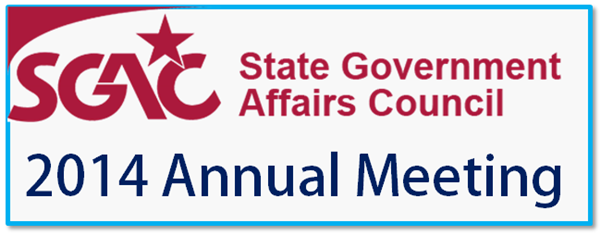
April 8, 2014 •
Liberals Win Majority in Quebec Election
A special election was held in Quebec on April 7, resulting in a new majority government. Premier Pauline Marois, leader of the Parti Quebecois, called the election hoping her party would garner a majority of seats within the National Assembly. […]

A special election was held in Quebec on April 7, resulting in a new majority government.
Premier Pauline Marois, leader of the Parti Quebecois, called the election hoping her party would garner a majority of seats within the National Assembly. However, the Liberals took 70 of the 125 seats, giving them a majority of seats in the legislature.
Marois lost her own seat in the Charlevoix-Cote-de-Beaupre riding, causing her to step down as the leader of the Parti Quebecois. Liberal Leader Phillipe Couillard will become the new Premier of Quebec.
Virginia Gov. Terry McAuliffe has submitted technical changes to the General Assembly on the major ethics legislation passed this session, including a change to the effective date of the legislation. The legislation enacts a limit on gifts from lobbyists and […]
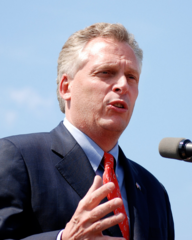
Virginia Gov. Terry McAuliffe has submitted technical changes to the General Assembly on the major ethics legislation passed this session, including a change to the effective date of the legislation.
The legislation enacts a limit on gifts from lobbyists and principals and increases the frequency for lobbyist filings.
The changes must be approved by the House and Senate before the legislation takes effect.
Photo of Gov. Terry McAuliffe courtesy of Kate Wellington in Wikimedia Commons.
April 8, 2014 •
Tuesday Lobbying and Campaign Finance News Update
Lobbying “Bottom Line” in The Hill. Ottawa, Canada: “City rules allow lobbyists to donate to councillors’ campaigns” by Joanne Chianello in the Ottawa Citizen. Campaign Finance “FEC Publishes New Contribution Limits for 2013-2014” by Kent Cooper in Roll Call. Delaware: […]

Lobbying
“Bottom Line” in The Hill.
Ottawa, Canada: “City rules allow lobbyists to donate to councillors’ campaigns” by Joanne Chianello in the Ottawa Citizen.
Campaign Finance
“FEC Publishes New Contribution Limits for 2013-2014” by Kent Cooper in Roll Call.
Delaware: “Del. lawmakers eye campaign finance bill” by The Associated Press in The Washington Times.
Maine: “Maine rethinking campaign contribution limits after Supreme Court ruling” by Reid Wilson (Washington Post) in the Bangor Daily News.
New York: “NY ethics board tells 4 advocacy groups it won’t shield names of their financial backers” by The Associated Press in The Republic.
Ethics
California: “California lawmakers propose reforms to regain public trust after series of scandals” by Fenit Nirappil (Associated Press) in the Daily Bulletin.
Georgia: “Deal proposes overhaul of Ga. ethics commission” by Phillip Lucas (Associated Press) in The Telegraph.
Georgia: “Another lawsuit from ex-ethics staffer is in the works” by Greg Bluestein in The Atlanta Journal-Constitution.
Pennsylvania: “Pa. Senate committee approves ban on cash gifts” by Amy Worden in The Philadelphia Inquirer.
From the State Legislatures
California: “State lawmakers’ per diem claims topped $1.1M in 2013” by Nick Heynen and Matthew Defour in the Wisconsin State Journal.
Elections
“Report finds states cutting wait times for voters” by Martha T. Moore in USA Today.
April 8, 2014 •
Charlotte City Council Selects New Mayor
The Charlotte City Council has appointed a new mayor after the abrupt resignation of former mayor Patrick Cannon following his arrest on federal corruption charges. North Carolina State Senator Dan Clodfelter was named mayor of Charlotte and will be sworn-in […]

The Charlotte City Council has appointed a new mayor after the abrupt resignation of former mayor Patrick Cannon following his arrest on federal corruption charges.
North Carolina State Senator Dan Clodfelter was named mayor of Charlotte and will be sworn-in on Wednesday. Clodfelter will become Charlotte’s fourth mayor since the spring of 2013. His term expires in December 2015.
Photo of the Charlotte, North Carolina Skyline by Riction on Wikimedia Commons.
April 8, 2014 •
Maryland General Assembly Adjourns
The General Assembly adjourned late Monday, April 7, 2014, after approving bills to decriminalize marijuana and raise the state minimum wage. Legislators also approved two lobbying bills addressing ethics training requirements and lobbyist certifications of authorization to lobby. The new […]

The General Assembly adjourned late Monday, April 7, 2014, after approving bills to decriminalize marijuana and raise the state minimum wage.
Legislators also approved two lobbying bills addressing ethics training requirements and lobbyist certifications of authorization to lobby.
The new lobbying requirements in Senate Bill 92 and Senate Bill 90 will be effective October 1, 2014, unless Gov. Martin O’Malley vetoes the measures by May 27, 2014.
April 7, 2014 •
Iowa Corporate Contribution Ban Upheld
Corporations in Iowa are still prohibited from making campaign contributions, despite an attempt by non-profit corporation Iowa Right to Life Committee, Inc. to remove the ban. The Supreme Court of the United States denied review of the Eighth Circuit Court […]
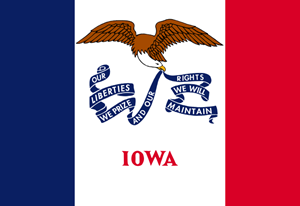
Corporations in Iowa are still prohibited from making campaign contributions, despite an attempt by non-profit corporation Iowa Right to Life Committee, Inc. to remove the ban. The Supreme Court of the United States denied review of the Eighth Circuit Court of Appeals case with no comment.
In Iowa Right to Life v. Tooker, plaintiff Iowa Right to Life alleged the ban on corporate contributions is an unconstitutional bar to free speech and equal protection. The Eighth Circuit did not agree, thus upholding the ban.
April 7, 2014 •
Monday News Roundup
Lobbying “Lobbyists kick in for Ready for Hillary” by Anna Palmer in Politico. Alabama: “Lobbying for former Alabama Legislature limited” by The Associated Press in the Daily Press. Kentucky: “Ethics Reporter: Health care lobbying tops spending list first two months […]

Lobbying
“Lobbyists kick in for Ready for Hillary” by Anna Palmer in Politico.
Alabama: “Lobbying for former Alabama Legislature limited” by The Associated Press in the Daily Press.
Kentucky: “Ethics Reporter: Health care lobbying tops spending list first two months of 2014 session” by the Kentucky Legislative Ethics Commission in KyForward.
New York: “Lobbyists ready to get to work now that state budget is completed” by Tom Precious in The Buffalo News.
Wisconsin: “Lobbyist bill draws sharp reactions” by Bill Lueders in The Dunn County News.
Campaign Finance
“High Court Rejects New Campaign Finance Case” by The Associated Press in Time.
“Nancy Pelosi pushes campaign finance reforms” by Lauren French in Politico.
“John Roberts’s rules of money in politics” by Josh Gerstein in Politico.
“Campaign finance ruling shakes political world” by James R. Carroll in The Courier-Journal.
“Rep. Robert Pittenger Pays $31,000 Fine” by Kent Cooper in Roll Call.
California: “How Will the Change in Campaign Finance Law Affect California?” by Scott Shafer in The California Report.
Connecticut: “Foleys Plead Guilty In Campaign Scheme Linked To Rowland” by Edmund H. Mahony and Jon Lender in The Courant.
Michigan: “Election campaign finance reports in Kalamazoo County to go online under Michigan pilot program” by Alex Mitchell in Michigan Live.
Ethics
“FEC Member Says it Aloud: We’re Dysfunctional” by Charles S. Clark in Government Executive.
Colorado: “Colorado ethics group hears arguments in Gov. Hickenlooper complaint” by Lynn Bartels in The Denver Post.
Georgia: “Former State Ethics Commission Director testifies in court” by Richard Elliot in WSB TV News.
Georgia: “Former ethics attorney said bosses didn’t want deep Deal investigation” by Aaron Gould Sheinin in The Atlanta Journal-Constitution.
Missouri: “Mo. Senate panel endorses ethics law overhaul” by The Associated Press in The Rolla Daily News.
Pennsylvania: “States look harder at rules on gifts to lawmakers” by Amy Worden in The Inquirer.
Rhode Island: “R.I. lawmakers debate ethics oversight bills, hold for further study” by Randal Edgar in The Providence Journal.
West Virginia: “Ethics commission talks board changes” by Phil Kabler in the Charleston Gazette.
April 4, 2014 •
Georgia Jury Awards Former Ethics Commission Director $700,000
A jury verdict has ordered the state to pay Stacey Kalberman $700,000 for unfairly forcing her from office. The jury found the former director of the ethics commission was unfairly forced from office as retribution for investigating Gov. Nathan Deal’s […]

A jury verdict has ordered the state to pay Stacey Kalberman $700,000 for unfairly forcing her from office. The jury found the former director of the ethics commission was unfairly forced from office as retribution for investigating Gov. Nathan Deal’s 2010 campaign.
Kalberman sued her former employer, claiming the commission’s decisions to cut her salary by $35,000 and eliminate her top deputy’s position were in response to her desire to issue subpoenas for records in the investigation.
Attorneys for the commission argued the motivation for the cuts was concern for a budget crisis. Holly Laberge, who replaced Kalberman, testified she did not find a budget crisis when she took office.
Elizabeth Bartz, president and CEO of State and Federal Communications, is appearing as a panelist at the Broadcast Education Association (BEA) 2014 Conference in Las Vegas on Sunday, April 6. Bartz, who is a graduate of Kent State University’s School […]
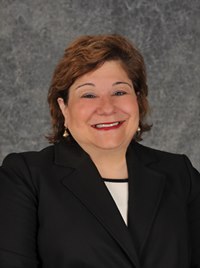
Elizabeth Bartz, president and CEO of State and Federal Communications, is appearing as a panelist at the Broadcast Education Association (BEA) 2014 Conference in Las Vegas on Sunday, April 6.
Bartz, who is a graduate of Kent State University’s School of Journalism and Mass Communication, is joining the panel “How Broadcast Media Stays Relevant in a Changing Global Environment” with Evan Rosenblum of TMZ & TMZ Sports and Heather Zimmer of Parchment, Inc.
Here is a description of the session from the BEA website:
“Academic media professionals must stay relevant in our ever-changing broadcast environment. We must ensure we not so enamored with today’s technology that we diminish the foundational skills and professional values that prepare students for the world beyond traditional and “new” media. What we teach lays a foundation for making students relevant across all disciplines whether or not they hold a camera, microphone, punch a switcher or write a web story.”
Congratulations, Elizabeth!
April 4, 2014 •
Utah: Lobbyist Name Tags Required Starting in August
Beginning August 1, 2014, a lobbyist may not lobby a public official while at the Utah Capitol Hill complex unless the lobbyist is wearing a newly required name tag in plain view. House Bill 246, which Governor Gary Herbert signed […]
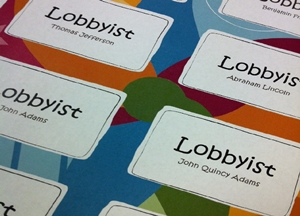
Beginning August 1, 2014, a lobbyist may not lobby a public official while at the Utah Capitol Hill complex unless the lobbyist is wearing a newly required name tag in plain view.
House Bill 246, which Governor Gary Herbert signed this week, will require all lobbyists be issued name tags bearing the word lobbyist and the lobbyist’s full name in at least 18-point type. The procedure to apply for name tags is being developed by the Lieutenant Governor’s Office and will be available before August 1, 2014. The Capitol Hill complex includes the grounds, monuments, parking areas, buildings, and other man-made and natural objects within the area bounded by 300 North Street, Columbus Street, 500 North Street, and East Capitol Boulevard, in Salt Lake City.
Additionally, the new law has raised the lobbyist registration fee from $100 to $110 and now requires lobbyists to inform public officials of the identity of whom the lobbyist is representing at the beginning of a lobbying communication.
State and Federal Communications, Inc. provides research and consulting services for government relations professionals on lobbying laws, procurement lobbying laws, political contribution laws in the United States and Canada. Learn more by visiting stateandfed.com.


